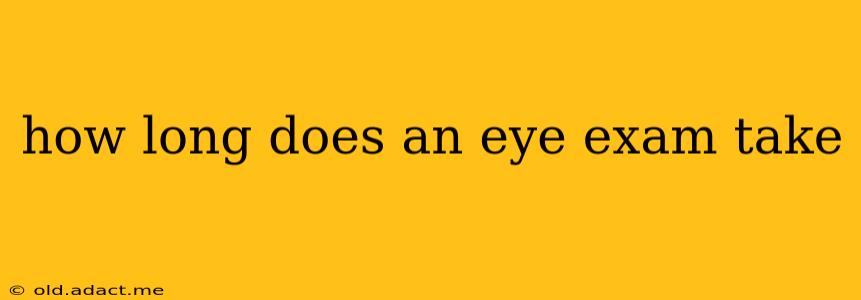A comprehensive eye exam can take anywhere from 30 minutes to an hour or more, depending on several factors. While a quick vision screening might be shorter, a thorough examination designed to detect potential eye diseases and assess overall eye health takes significantly longer. This time commitment ensures your eye care professional can accurately assess your vision and eye health.
What Factors Influence the Length of an Eye Exam?
Several variables influence the total time spent during your eye exam. These include:
-
The type of exam: A basic vision screening focusing solely on refractive error (nearsightedness, farsightedness, astigmatism) will be much quicker than a comprehensive dilated eye exam. A comprehensive exam includes a much broader assessment of your overall eye health, looking for conditions like glaucoma, cataracts, macular degeneration, and diabetic retinopathy.
-
Your individual needs: If you have pre-existing eye conditions or a family history of eye disease, your doctor will need to spend more time conducting a more thorough examination.
-
The complexity of any findings: If the doctor discovers anything unusual during the exam, additional tests or a referral to a specialist may be necessary, extending the appointment length.
-
The doctor's schedule and patient volume: While a doctor aims to allocate sufficient time for each patient, unexpected delays can occur depending on the clinic's scheduling and patient volume.
What Happens During a Comprehensive Eye Exam?
A comprehensive eye exam typically involves the following steps:
-
Visual acuity test: This assesses your sharpness of vision using an eye chart.
-
Refraction: This determines your refractive error and helps determine the prescription for glasses or contact lenses.
-
External eye examination: This involves checking the health of your eyelids, lashes, and the structures surrounding your eyes.
-
Intraocular pressure measurement: This measures the pressure inside your eye to screen for glaucoma.
-
Pupil dilation: In many cases, your pupils will be dilated with eye drops to allow for a more thorough examination of the internal eye structures. This dilation may cause temporary light sensitivity.
-
Ophthalmoscopy: This is an examination of the internal structures of your eye using an ophthalmoscope. This allows the doctor to assess the retina, optic nerve, and blood vessels.
How Long Does a Dilated Eye Exam Take?
A dilated eye exam typically adds to the overall time of a comprehensive eye exam. The dilation process itself takes approximately 20-30 minutes, with the effects lasting several hours. The examination of the dilated eye will add additional time to your appointment.
What Should I Expect After My Eye Exam?
Following your exam, your eye doctor will discuss the results with you, answering any questions you may have. They'll explain any findings, discuss treatment options if necessary, and schedule follow-up appointments if needed.
Can I Get a Quick Eye Exam?
Yes, some clinics offer shorter vision screenings, focusing mainly on refractive error to determine your prescription for glasses or contact lenses. However, these screenings are not a substitute for a comprehensive eye exam, which is crucial for detecting and managing potential eye diseases.
In conclusion, while a basic vision screening can be quick, a thorough and comprehensive eye exam that prioritizes your overall eye health is a longer process. The time spent is an investment in your long-term vision health and well-being. Always consult with your eye care professional to determine the type and length of eye exam best suited to your individual needs.
